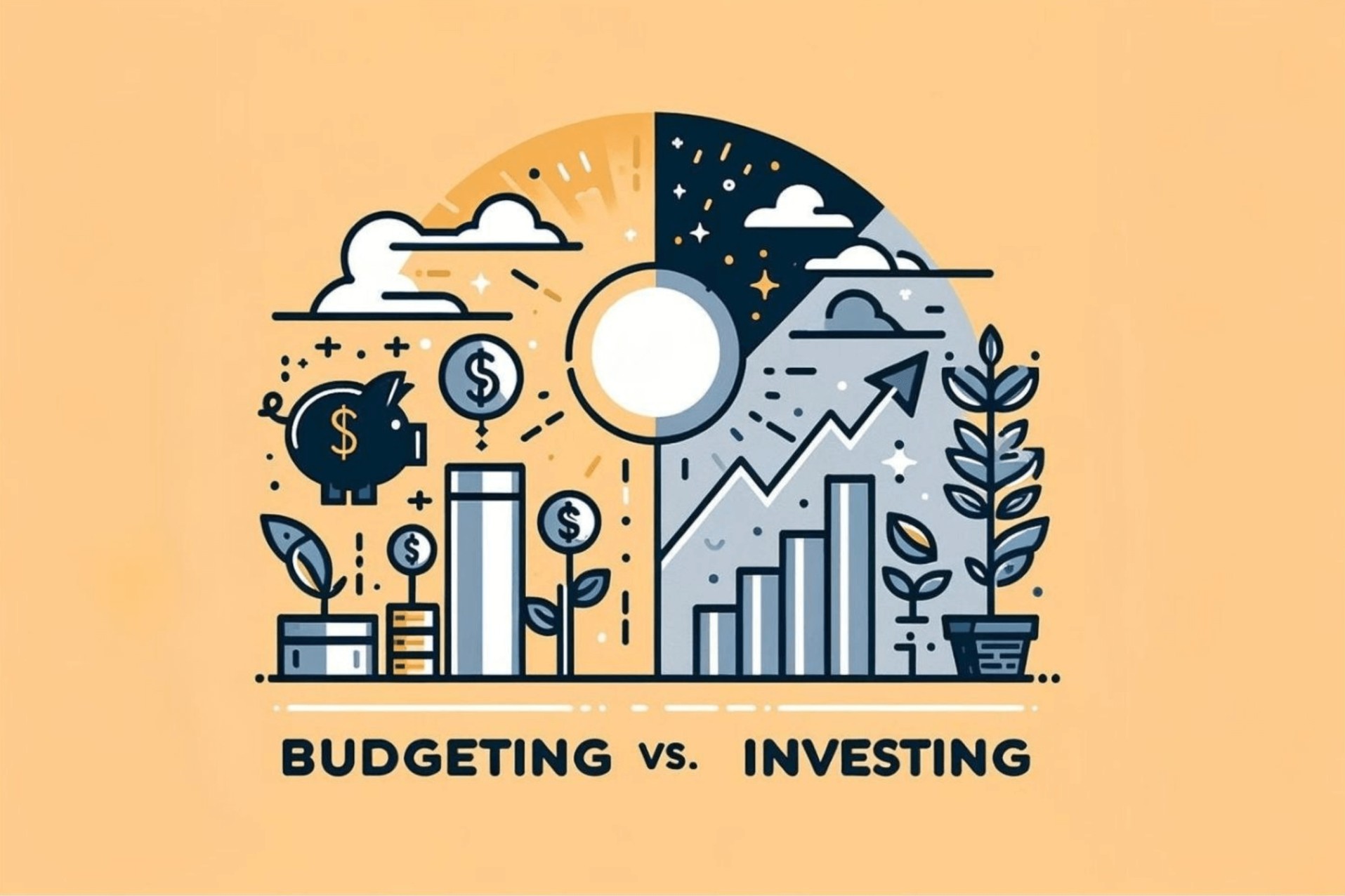
Budgeting vs. Investing: Maximizing Your Financial Health
Achieving financial stability and growth requires two key pillars in the complicated realm of personal finance: investment and budgeting. Though they have diverse applications, each of these ideas are essential on the path to financial independence. This thorough guide dives deeply into the subtleties of investing and budgeting, providing you with useful tips and techniques to help you along the way.
Key Takeaways:
Table 1: Quick Comparison of Budgeting vs. Investing
|
Feature |
Budgeting |
Investing
|
|
Purpose
|
To
meticulously plan and manage current and future expenditures. |
To
strategically grow wealth over time through various asset acquisitions. |
|
Time
Horizon |
Primarily
short-term, focusing on monthly or yearly financial planning. |
Long-term
perspective, often spanning years or even decades. |
|
Risk
|
Generally
low, focusing on planned expenditures and savings. |
Varies
from low to high, influenced by the types of investments and market
conditions. |
|
Return
|
Achieves
savings through efficient spending and avoiding unnecessary debt. |
Offers
the potential for significant financial growth, outpacing the original
investment. |
Key Insight: While investing concentrates on accumulating wealth for future financial security and happiness, effective budgeting is the cornerstone of prudent financial management. Having both is essential to reaching overall financial well-being.
Part 1: Mastering Budgeting
Budgeting is a useful technique for reaching financial management and clarity rather than just being a constraint exercise. Budgeting guarantees that you may meet your necessities, save for the future, and enjoy pleasures without going over your means. It does this by laying out a strategy for how you will spend your money.
The Significance of Budgeting
· Enhanced Financial Control: A well-structured budget offers a detailed snapshot of your finances, empowering you with the knowledge to make informed spending decisions.
· Goal-Oriented Spending: It serves as a financial roadmap, helping you to prioritize expenditures that align with your personal and financial aspirations.
· Cultivation of Discipline: Regular adherence to a budget fosters discipline, encouraging responsible spending habits that steer clear of debt and financial insecurity.
Crafting a Functional Budget
1. Determine Your Income: Compile all sources of income to understand your financial starting point.
2. Categorize Expenses: List and categorize your expenses to identify necessary versus discretionary spending.
3. Fixed vs. Variable Expenses: Differentiate between expenses that remain constant and those that fluctuate, allowing for more flexible financial planning.
4. Set Financial Objectives: Define clear, achievable financial goals that guide your budgeting strategy.
5. Monitor and Adjust: Regularly review your budget to ensure it remains aligned with your financial situation and goals, adjusting as necessary.
Part 2: The Strategic World of Investing
Investing is more than just conserving money; it's about allocating your resources wisely in order to increase your wealth and earn rewards. The beauty of investment is that it can change your financial situation by creating opportunities for wealth growth that savings cannot.
The Importance of Investing
· Accelerated Wealth Growth: Through strategic investment choices, you have the potential to significantly increase your financial portfolio beyond what traditional savings can offer.
· Protection Against Inflation: Investments can serve as a hedge against inflation, preserving the purchasing power of your money over time.
· Achievement of Financial Ambitions: Investing can be a powerful vehicle for realizing your most significant financial goals, from homeownership to retirement planning.
Exploring Investment Avenues
· Stocks: Offer ownership in a company with the potential for high returns, albeit with higher risk.
· Bonds: Provide a more stable investment option with fixed interest payments, suited for risk-averse investors.
· Mutual Funds: Allow investors to pool their money in a diversified portfolio managed by professionals, balancing risk and return.
· Real Estate: Offers tangible asset investment, with potential income through rent and property appreciation, though it requires significant capital and management.
Table 2: Pros and Cons
of Common Investment Types
|
Investment Type |
Pros |
Cons |
|
Stocks |
Potential for
substantial returns |
Subject to market
volatility |
|
Bonds |
Stability and
predictable returns |
Generally lower
returns compared to stocks |
|
Mutual Funds |
Professional
management and diversification |
Associated fees
and costs |
|
Real Estate |
Can provide
steady income and appreciation |
High entry cost
and requires active management |
Synergizing Budgeting and Investing
Investing and budgeting are both integrated into a well-rounded financial plan, utilizing their respective advantages to create a solid financial base. Your long-term goals can be more successfully attained, and your financial growth can be accelerated by investing budgetary resources.
Harmonizing Budgeting with Investing
1. Allocate Funds for Investing: Within your budget, earmark a specific portion for investments, treating it as a non-negotiable expense.
2. Commence with Small Investments: Small, consistent investments can grow significantly due to compound interest, making it accessible for those with limited budgets.
3. Adopt a Diversified Strategy: Diversify your investment portfolio to mitigate risk, spreading your investments across different asset classes.
Wrapping Up
Within the financial toolset, investing and budgeting are complementary tactics rather than antagonistic ones. Budgeting is the cornerstone that gives you the structure and discipline you need to manage your money well. On the other side, investing is the catalyst for wealth creation, providing chances for both personal growth and the achievement of your goals. You can steer towards a future of financial stability and abundance by confidently navigating the financial environment by comprehending and putting the principles of investing and budgeting into practice.ASAN Can Help
Empower your financial future with ASAN's expert guidance on Maximizing Your Financial Health, aligning investments with your goals for true financial freedom.
Ready to take the next step?
Contact Us
📞 Phone: +1(613)-981-7097
🌐 Website: asangroupinc.com
Disclaimer:
The information provided in this blog is intended for general guidance and informational purposes only and should not be considered as professional accounting, audit, or assurance advice. Please consult with a certified professional for specific advice tailored to your situation.

